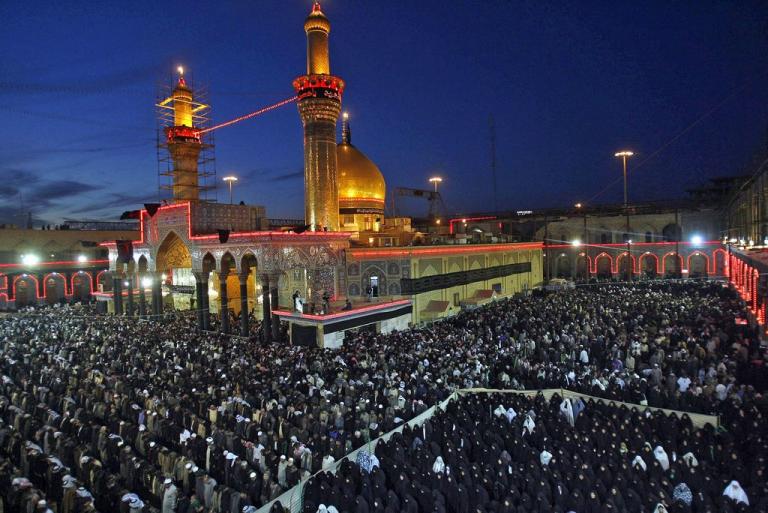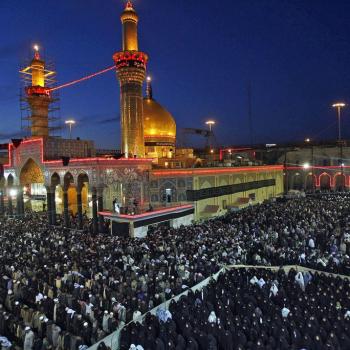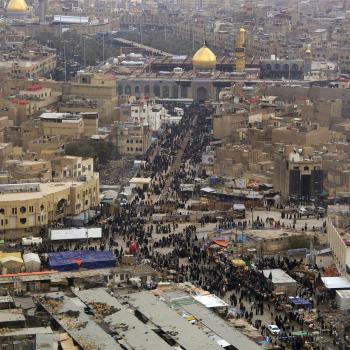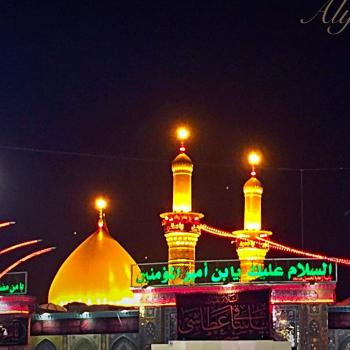 Yesterday’s Jumah khutba (sermon) was once again a reminder of how some of the inventions have crept into Muslim minds. The Imam quoted a hadith from Prophet Muhammad, spending nearly all of the khutba on the importance of fasting on Ashura- the 10th of Muharram, and didn’t mention the tragic events of Karbala in 61 AH, when the beloved grandson of Prophet Muhammad, Imam Hussain, was brutally butchered, and marks a turning point in Islamic history. (OK, he actually spent a few seconds at the end that he will speak more about Ashura on the eve of Ashura next week).
Yesterday’s Jumah khutba (sermon) was once again a reminder of how some of the inventions have crept into Muslim minds. The Imam quoted a hadith from Prophet Muhammad, spending nearly all of the khutba on the importance of fasting on Ashura- the 10th of Muharram, and didn’t mention the tragic events of Karbala in 61 AH, when the beloved grandson of Prophet Muhammad, Imam Hussain, was brutally butchered, and marks a turning point in Islamic history. (OK, he actually spent a few seconds at the end that he will speak more about Ashura on the eve of Ashura next week).
I posted three years ago why the hadith (that this and so many other Imams have quoted) that calls for fasting on Ashura is forged.
Once again, I apologize to anyone whose feelings may get hurt. But one of the lessons learned from Karbala is to uphold the truth and the truth must be spoken as this hadith is being propagated like a forest fire.
Growing up some 5 decades ago, we never saw anyone fasting on Ashura in the country (Pakistan) I grew up. Even when I migrated to USA about 39 years ago, I don’t recall Imams talking about it, or people fasting on Ashura. This hadith has taken hold in the last 15-20 years.
There are a number of reasons why I know this hadith is forged as it has more holes than Swiss cheese.
- Look at the chain of narration: The Hadith is typically narrated by four people. These four were either not present in Medina at the time of Hijra or were very young (Ibn Abbas was 4 years old, Abu Musa Al Ashri was in Yemen at the orders of Prophet Muhammad, Abu Herrera didn’t enter Medina until Hijra 7-8 at the time of the battle of Khyber, and Ma’awiyah bin Abu Safyan(the father of Yazid) who did not convert until 8th of Hijra or after the conquer of Mecca some 8 years after Hijra). If they were not present at the time of the Hijra, how were they able to quote what they heard Prophet Muhammad say at the time? It is also of note that the 2nd Caliph, Umar Ibn Khattab, stripped Abu Herrera of his governorship for making money of narrating Hadith and accused him of fabrication.
- The hadith says, people told Prophet Muhammad that Jews are fasting because that day Moses and the Israelites were saved from drowning. But the Jews actually fast on Yom Kippur- the 10th of Tisheri in the Hebrew calendar. Yom Kippur is the Day of Atonement and commemorates God atoning for the sin of Golden Calf and the 2nd revelation of the 10th Commandment at Mount Sinai, not the drowning of Pharaoh.
- The math also does not work- even if the Jews of Medina were fasting on the 10th of Tisheri, the 10th of Tisheri and 10th of Muharram corresponded, and fell on the same day was only in the year 28 AH- 28 year after Hijra. Prophet Muhammad passed away in the year 11 AH!
- Prophet Muhammad did not migrate to Medina in Muharram…it was the month of Rabi Al Awwal.
- According to Ibn Al Athir, the great Islamic historian and author of Al Kamil Fil al Tarikh (The Complete History), Ashura has an old usage and the new usage. Ashura means the tenth. At the time of the Prophet, it was used for the 10th of any month. After Karbala, Ashura was used exclusively for 10th of Muharram. Therefore the hadith could not have meant the 10th of Muharram.
Here is a link to my article from three years ago, outlining the reasons why this hadith has to be a forged one and the reasons behind forging the hadith.
Ashura and the Fake Hadith About Fasting | Ejaz Naqvi MD (patheos.com)
So please think deeply before accepting a hadith. Explore on your own. My pledge to the Imams is the same- if you are doing i t unintentionally, explore the facts before preaching. Your words mean a lot to the community, so please choose your words and preaching wisely.
Yes, Muharram was one of the holy months even before the tragedy of Karbala in the year 61 AH (680 CE). It is said that Adam met Eve on Earth on Ashura. Noah’s boat settled on this date and much more. But after the family of the Prophet was brutally murdered in the desert heat of Karbala, it became the focal point of Ashura.
That should be the focal point of Muharram and Ashura. One of the hadith says “Anyone who loves Al-Hasan and Al-Hussain has indeed loved me, and anyone who hates them has indeed hated me.”
Ignoring, or putting on the back burner the sacrifice of Imam Hussain is disrespecting the legacy of Imam Hussain, and therefore disrespecting the Prophet’s wishes. To remember and honor Imam Hussain and his family and companions’ great sacrifice to save Islam is the best way to show our love to our Prophet.

















